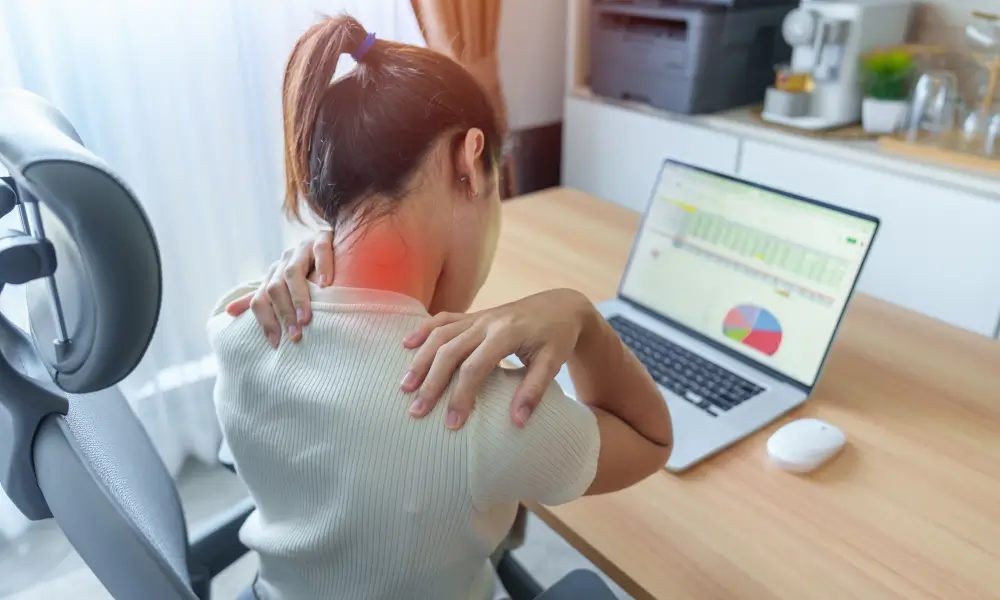Stiff Neck? Causes, Remedies, and How to Prevent It from Coming Back

TABLE OF CONTENTS
Neck stiffness affects most people at some point in their lives, making it one of the most common physical complaints. The painful restriction you feel when turning your head can start your day badly an d hurt your mood and work output.
A stiff neck rarely requires emergency care, but untreated cases can substantially disrupt everyday activities. Women experience neck pain more frequently, and the risk grows as people age. The first step to finding relief that works comes from knowing why neck stiffness happens. This article explores stiff neck causes, symptoms, proven treatments, and ways to keep the pain from coming back.
What Causes a Stiff Neck? (More Than Just Sleeping Wrong)
Neck stiffness has several root causes beyond awkward sleeping positions. These include:
Looking down at phones or computers with poor posture frequently leads to neck stiffness.
Stress and overworked muscles often trigger stiffness in the neck area.
The neck becomes stiff from uncomfortable sleep positions, sprains, accident-related whiplash, and extended screen time.
Several medical conditions can trigger neck problems. These include:
Cervical spondylosis (arthritis of the neck)
Herniated discs
Pinched nerves
The nerve roots in your neck can develop cervical radiculopathy that sends pain signals to your shoulders and arms.
Symptoms That May Indicate Something Serious

Most neck stiffness gets better with home treatment. These warning signs need immediate attention:
When a Stiff Neck is Linked to Nerve Issues
Nerve roots in your neck can develop cervical radiculopathy from compression or irritation. Sharp or burning pain radiates down one arm, and you might experience numbness, tingling, and weak muscles. Certain neck movements make this pain worse.
Age-related disc degeneration or herniated discs typically cause nerve compression. The C7 nerve root faces the most impact, followed by C6 and C8 nerve roots.
Best At-Home Remedies and Stretches
Quick treatment of a stiff neck prevents long-term problems. Simple home remedies usually work before you need to see a doctor. These include:
Ice packs reduce inflammation in the first 24-48 hours, then heat therapy improves blood flow
NSAIDs like ibuprofen or naproxen help decrease inflammation
Give yourself 1-2 days of rest, but staying completely inactive weakens your supporting muscles
Simple neck stretches work well - try neck tilts, rotations, and shoulder rolls
Walking and other low-impact exercises boost circulation and speed up healing
A gentle massage of the sore area helps relax tight muscles
When to Seek Medical Help
Combined symptoms of fever, headache, and neck stiffness point to possible meningitis
Pain radiates down one arm with weakness, numbness or tingling
Your neck hurts after an accident or injury
Home treatment doesn't help after 1-2 weeks
Your neck's lymph nodes stay swollen
Prevention Tips for Future Neck Pain
Keep your computer screen at eye level for good desk posture
Step away from screens every hour to stretch
Use an ergonomic pillow while sleeping on your back or side
Regular water intake keeps your cervical discs healthy
Meditation or mindfulness reduces stress
Regular exercises strengthen your neck muscles
FAQs
How long does a stiff neck usually last?
A stiff neck gets better within a few days if you take good care of it. The symptoms might go away quickly or stick around longer, depending on what caused them. Your pain and stiffness should naturally improve within a week if there's no serious problem. You should see a doctor if the stiffness stays longer than a few days despite treating it at home.
Is it okay to exercise with a stiff neck?
Light exercise helps with neck stiffness. You should start moving as soon as your doctor gives you the green light to prevent more stiffness. Your recovery becomes harder if you stay inactive too long - more than a couple of days. Exercise creates a pain-relieving effect. You should stop right away if you feel severe pain or weakness in your hands or arms.
What sleeping position is best to prevent a stiff neck?
Your neck experiences the least strain when you sleep on your back or side. Back sleepers need a rounded pillow that supports their neck's natural curve and a flatter one for the head. A pillow that keeps your head lined up with your spine works best for side sleeping. Sleeping on your stomach is not recommended because it twists your neck all night.
Can stress cause a stiff neck?
Psychological stress often makes your neck stiff. Your muscles tighten up during stressful times as part of your body's "fight-or-flight" response. These muscles stay tense much longer than they should when stress becomes chronic. This ongoing tension creates pain, stiffness, and discomfort. Your tense neck muscles can relax with stress management techniques like meditation or mindfulness.
When should I worry about a stiff neck?
Get medical help right away if your stiff neck comes with:
Fever and headache (potential meningitis)
Nausea or vomiting
Light sensitivity or confusion
Numbness or tingling in the arms
Balance problems or coordination issues
Unexplained drowsiness






